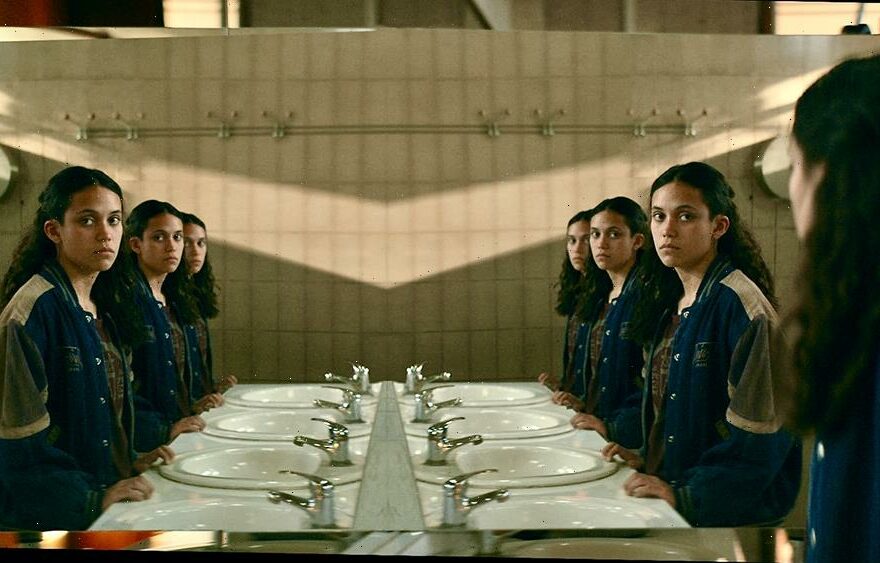Chile’s Oscar entry, “Blanquita” by Fernando Guzzoni, is based on the infamous “Spiniak Case,” the exposure in the early 2000s of a child prostitution/pedophilia ring involving powerful Chilean politicians and businessmen. After a year-long investigation of the case, Guzzoni zeroed in on the most interesting character in the child sex scandal, Gema Bueno, a key witness whose story began to unravel as prosecutors began to poke holes in her testimony.
In his thought-provoking thriller, Guzzoni bases his titular character Blanquita on Bueno. Played by Laura Lopez, Blanquita is now 18 and has returned to the shelter for victims of sexual violence with a baby in tow. Living there in exchange for domestic chores, she becomes the most credible witness in the case against the pedophile ring. Coaxed by the priest (Alejandro Goic) who runs the shelter, she claims to be a victim of sex trafficking and accuses a senator of participating in the ring. Both she and the priest are pressured to back down but they push on despite the threats. Inevitably, her lies catch up with her and she is penalized. “You can rape but I can’t lie,” she declares in disgust. protect her, pushed
As Guzzoni explains in his director’s statement: “‘Blanquita’ is an inquiry about personal truth, deception, ethics, and the interpretation of truth. Above all, it is about the double life of a girl or a girl whose lack of opportunities and constant let down by the very institutions which promised to protect her, pushed her to the limits.”
In a Director on Director conversation organised by CinemaChile, Sebastian Lelio, whose “A Fantastic Woman” snagged Chile’s first best international feature Oscar in 2017, spoke with Guzzoni to discuss the ideas and challenges behind the drama.
Sebastian Lelio: “It is a film full of provocative and complex ideas, which establishes an interesting relationship with viewers due to its game of empathy. The film plays with these built-in loyalties, and oscillates between different viewpoints to make us understand who’s who in this game of mirrors. For us viewers, that disorientation becomes its charm at times, almost the very essence of what I feel that you were trying to grasp in “Blanquita.” Does that resonate with you?
Fernando Guzzoni: Yes, totally. I think there is something interesting in challenging the viewer to situate himself/herself ethically and morally with the character, and gradually understand that the lie operates as an extra-moral exercise. The film has as its center of gravity the idea of the limits of representation within the story, this idea that the character builds a character, and that this new identity that she builds from that dramatic tragedy somehow gives the character an obstacle. She is neither a victim nor a villain. The film is built from the idea that here is a young woman who somehow has her identity stolen by the institutions or the street, because of this structural violence, the kind suffered by people who are not in the circuits of power, who do not have easy access to justice.
Lelio: God and the truth died, we are in the post truth era. And you chose a priest and a character who chooses life as a political weapon. That seemed very interesting to me, I don’t know when you filmed it, but at one point in the story, everything explodes, shatters and one is able to see a mosaic in motion. And the further one spirals into what the film offers, the harder it is to know what is what. It seems to be a very modern problem, in the era where everyone has a part in the collective writing. It’s that moment in which paradoxically we are most lost, where we do not know who to believe or what, or precisely what is real. It seems that beyond the political dimension of the case, which we will talk about…. In its more philosophical, conceptual relationships, the film engages in this problem very conscientiously, which seems to me a difficult concept to capture with the camera. Very subtle examples appear to me, that it seems to me that the film manages to achieve, and uses those elusive materials and make them its raw material. And I value that a lot, I think it’s one of the great strengths of the film.
Guzzoni: The idea that there is a Catholic priest persecuting a child exploitation network is paradoxical, and on the other hand, controversial, which is the origin of the real case and of the film. And this is fascinating as they establish this kind of amorality on the one hand, but with a noble objective on the other hand. The characters are not black and white. This catholic priest is a social fighter, but there is a certain degree of narcissism in his goal.
Lelio: I thought her look at the camera in the end was very beautiful, a classic gesture, but fundamental to your film that the last image is that of Blanquita looking back at us. Asking us what do you believe, where are you in this tangle? The spirit of the film is there, with that ending.

Read More About:
Source: Read Full Article
